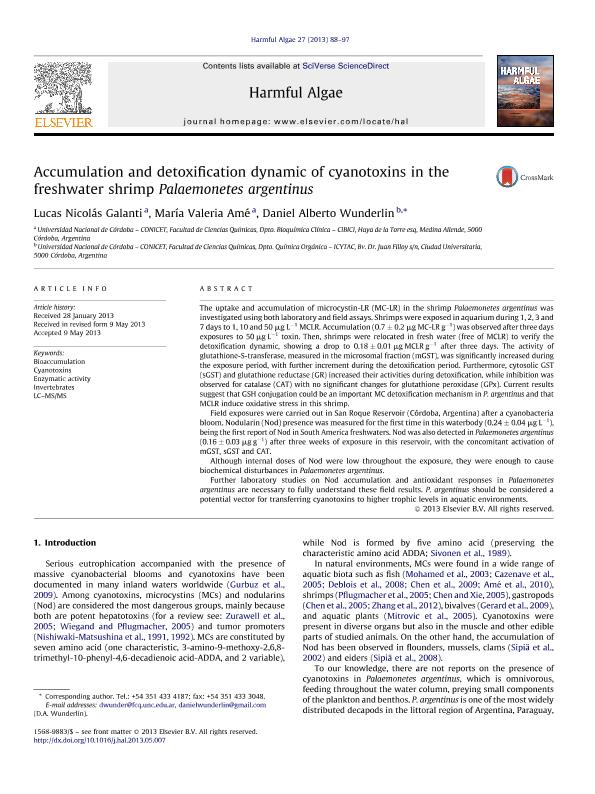Mostrar el registro sencillo del ítem
dc.contributor.author
Galanti, Lucas Nicolás

dc.contributor.author
Amé, María Valeria

dc.contributor.author
Wunderlin, Daniel Alberto

dc.date.available
2015-10-01T19:06:54Z
dc.date.issued
2013-07
dc.identifier.citation
Galanti, Lucas Nicolás; Amé, María Valeria; Wunderlin, Daniel Alberto; Accumulation and detoxification dynamic of cyanotoxins in the freshwater shrimp Palaemonetes argentinus; Elsevier Science; Harmful Algae; 27; 7-2013; 88-97
dc.identifier.issn
1568-9883
dc.identifier.uri
http://hdl.handle.net/11336/2273
dc.description.abstract
The uptake and accumulation of microcystin-LR (MC-LR) in the shrimp Palaemonetes argentinus was investigated using both laboratory and field assays. Shrimps were exposed in aquarium during 1, 2, 3 and 7 days to 1, 10 and 50 mg L1 MCLR. Accumulation (0.7 0.2 mg MC-LR g1 ) was observed after three days exposures to 50 mg L1 toxin. Then, shrimps were relocated in fresh water (free of MCLR) to verify the detoxification dynamic, showing a drop to 0.18 0.01 mg MCLR g1 after three days. The activity of glutathione-S-transferase, measured in the microsomal fraction (mGST), was significantly increased during the exposure period, with further increment during the detoxification period. Furthermore, cytosolic GST (sGST) and glutathione reductase (GR) increased their activities during detoxification, while inhibition was observed for catalase (CAT) with no significant changes for glutathione peroxidase (GPx). Current results suggest that GSH conjugation could be an important MC detoxification mechanism in P. argentinus and that MCLR induce oxidative stress in this shrimp. Field exposures were carried out in San Roque Reservoir (Co´ rdoba, Argentina) after a cyanobacteria bloom. Nodularin (Nod) presence was measured for the first time in this waterbody (0.24 0.04 mg L1 ), being the first report of Nod in South America freshwaters. Nod was also detected in Palaemonetes argentinus (0.16 0.03 mg g1 ) after three weeks of exposure in this reservoir, with the concomitant activation of mGST, sGST and CAT. Although internal doses of Nod were low throughout the exposure, they were enough to cause biochemical disturbances in Palaemonetes argentinus. Further laboratory studies on Nod accumulation and antioxidant responses in Palaemonetes argentinus are necessary to fully understand these field results. P. argentinus should be considered a potential vector for transferring cyanotoxins to higher trophic levels in aquatic environments.
dc.format
application/pdf
dc.language.iso
eng
dc.publisher
Elsevier Science

dc.rights
info:eu-repo/semantics/openAccess
dc.rights.uri
https://creativecommons.org/licenses/by-nc-nd/2.5/ar/
dc.subject
BIOACCUMULATION
dc.subject
CYANOTOXINS
dc.subject
ENZYMATIC ACTIVITY
dc.subject
INVERTEBRATES
dc.subject
LC-MS/MS
dc.subject.classification
Oceanografía, Hidrología, Recursos Hídricos

dc.subject.classification
Ciencias de la Tierra y relacionadas con el Medio Ambiente

dc.subject.classification
CIENCIAS NATURALES Y EXACTAS

dc.subject.classification
Biología Marina, Limnología

dc.subject.classification
Ciencias Biológicas

dc.subject.classification
CIENCIAS NATURALES Y EXACTAS

dc.title
Accumulation and detoxification dynamic of cyanotoxins in the freshwater shrimp Palaemonetes argentinus
dc.type
info:eu-repo/semantics/article
dc.type
info:ar-repo/semantics/artículo
dc.type
info:eu-repo/semantics/publishedVersion
dc.date.updated
2016-03-30 10:35:44.97925-03
dc.journal.volume
27
dc.journal.pagination
88-97
dc.journal.pais
Países Bajos

dc.journal.ciudad
Amsterdam
dc.description.fil
Fil: Galanti, Lucas Nicolás. Consejo Nacional de Investigaciones Científicas y Técnicas. Centro Científico Tecnológico Córdoba. Centro de Investigaciones en Bioquímica Clínica e Inmunología; Argentina
dc.description.fil
Fil: Amé, María Valeria. Consejo Nacional de Investigaciones Científicas y Técnicas. Centro Científico Tecnológico Córdoba. Centro de Investigaciones en Bioquímica Clínica e Inmunología; Argentina
dc.description.fil
Fil: Wunderlin, Daniel Alberto. Consejo Nacional de Investigaciones Científicas y Técnicas. Centro Científico Tecnológico Córdoba. Instituto de Ciencia y Tecnología de Alimentos Córdoba; Argentina
dc.journal.title
Harmful Algae

dc.relation.alternativeid
info:eu-repo/semantics/altIdentifier/url/http://www.sciencedirect.com/science/article/pii/S1568988313000796
dc.relation.alternativeid
info:eu-repo/semantics/altIdentifier/doi/http://dx.doi.org/10.1016/j.hal.2013.05.007
Archivos asociados
